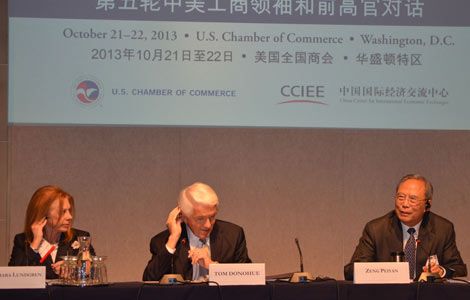High reform hopes before plenum
Updated: 2013-10-28 07:03
By Louis Kuijs and Xiaocun Tiffany Qiu (China Daily)
|
||||||||
So what should be expected from the plenum?
Many of the specific areas of economic reforms have been advocated and discussed for many years. Nonetheless, at this stage in the policy cycle, we do not expect many announcements on speedy implementation of reforms. Rather, we expect the leadership to present a statement with objectives and directions of reforms to rebalance the pattern of growth more toward domestic demand, consumption and services - and upgrading the industrial structure and moving up the value chain.
The broad principles are likely to be about market orientation, opening-up to and integration with the world economy, (improving the quality of) urbanization, innovation and "changing the government's management mode" (the role of the government in the economy).
We expect the political economy of reforms to play an important role in determining the relative emphasis on different areas. In line with the developments in recent years, we expect further headway in areas in which there is not much resistance, and little progress in areas where resistance is strong.
Thus, we think the leadership will set reasonably concrete principles and directions on how to move forward in areas with fairly broad agreements. This would be applicable to financial and monetary reforms, pricing and taxation of raw materials and more government spending on healthcare, education and social security.
In addition, the Party plenum will set some general objectives and principles in areas that senior leaders have emphasized but where the political economy is an obstacle to ambitious reforms. This includes the "new urbanization" drive, which calls for important but politically difficult reforms such as those of the hukou (house registration) and fiscal systems, and conversion of rural land for urban use. In spite of high expectations, signs are that there is limited scope for speedy movement on the fiscal and land reforms.
Clear principles and directions of the reforms are not likely to be spelled out for areas where the political economy is an obstacle and which have not been emphasized by senior leaders. They, according to our view, include areas such as leveling the playing field for State-owned enterprises and other companies.
This situation is not unique to China and it does not mean resistance cannot be overcome. Other countries have faced similar problems. Internationally, and in China's own past, with resistance standing in the way of further progress and development, strong leadership at the highest political level has sometimes been employed to push through difficult reforms.
The authors are economists with The Royal Bank of Scotland.
(China Daily 10/28/2013 page9)

 Serena completes dominant season with triumph
Serena completes dominant season with triumph
 Nuclear submarine fleet comes of age
Nuclear submarine fleet comes of age
 5 pharmacies begin to sell baby formula
5 pharmacies begin to sell baby formula Mother and four children stabbed to death in New York
Mother and four children stabbed to death in New York
 China Fashion Week S/S 2014: day 2
China Fashion Week S/S 2014: day 2
 Demonstrators protest against govt surveillance in US
Demonstrators protest against govt surveillance in US
 Where art thou, my love?
Where art thou, my love?
 Li Na reaches WTA Championships final
Li Na reaches WTA Championships final
Most Viewed
Editor's Picks

|

|

|

|

|

|
Today's Top News
High speed versus history
Southern states gear up for symposium
Film finds a hip-hop-tai chi connection
Jewelry exhibit dazzles Southern California
Obama aware of spying on Merkel: German paper
Five stabbed to death in NYC
Forum urges stable China-Japan ties
NSA spying hurts US diplomacy
US Weekly

|

|







